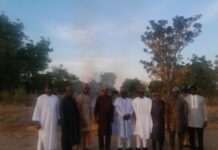Close to 800,000 children under the age of five are severely malnourished in Nigeria, Niger, Cameroon and Chad. “Lack of sufficient humanitarian funding is putting young children’s lives at risk,” warned the Secretary General of the Norwegian Refugee Council Jan Egeland.
Six months after world leaders met to commit support to the crisis in the Lake Chad region, 57 per cent of the US$2.2 billion needed to meet the most basic humanitarian needs in 2017 are still lacking.
Donor countries have delivered most of the $460 million promised at the Oslo conference for 2017, but the pledges just did not match the actual needs.
“The donations from the Oslo conference have been crucial, but we are not able to avert a massive loss of lives without large additional funding for our humanitarian operations in the conflict-ridden areas. We need improved security for civilians and aid workers, and access to all those in need, but we must also build a bigger humanitarian muscle that can provide for the suffering millions,” said Egeland.
Boko Haram’s violence has spread from Northern Nigeria to Niger, Cameroon and Chad – and developed into violent confrontations with the security forces in the region. It has cost thousands of people’s lives, forced millions to flee their homes and hampered people’s ability to cultivate their land. The latter has resulted in a devastating food crisis. In Nigeria 5.2 million people now remain food insecure, including 50,000 who are already living in famine-like conditions.
“We fear that we only see a portion of the massive needs, as large areas remain inaccessible for humanitarian organizations,” said Egeland.
A consultative group for Lake Chad consisting of representatives from Germany, Norway and the UN, in addition to the four countries surrounding Lake Chad, will have their first meeting in Berlin on Wednesday, 6 September. The Norwegian Refugee Council stresses the need to put humanitarian funding and access at the top of the agenda.
“Inadequate funding is currently hampering our ability to deliver timely and life-saving assistance to people in need. Before this is put in place, there will be no hope and stability in the region,” Egeland said.



